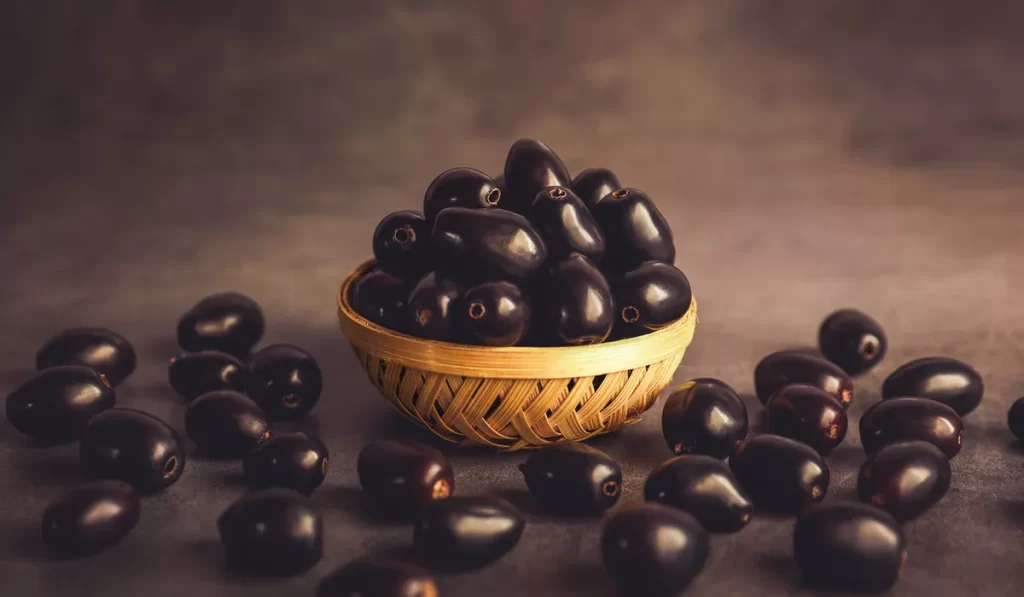Get to know the dark purple guava fruit, along with its benefits and precautions.
The Indian gooseberry is a native Thai fruit that many people may have seen but do not know its true properties. The Indian gooseberry has a sweet and sour taste and is slightly astringent. The flesh is dark purple and has a unique aroma. It is used for eating fresh, processing, or as an ingredient in traditional herbal medicine. Let’s get to know more about the Indian gooseberry, along with precautions for eating it, in order to get the benefits and not risk side effects.

What is a guava ?
Syzygium cumini is a fruit native to South and Southeast Asia, including Thailand. It belongs to the Myrtaceae family. The tree is tall and large. The fruit is small, oval-shaped, green when raw and turns dark purple, almost black, when ripe. The purple flesh has a sweet and sour taste and is slightly astringent.
The Indian gooseberry is often eaten fresh or processed into juice, jam, wine and pickled Indian gooseberry. In addition, parts of the tree, such as the bark, leaves and seeds, are used in traditional herbal medicines.
The taste of the Indian gooseberry
The guava fruit has a sweet and sour taste with a slightly astringent taste. The flesh is juicy and has a unique aroma. If eaten fresh, it may feel astringent on the tongue and some people may feel a dry throat.
In which month do Indian jujubes bear fruit?
The Indian gooseberry is a seasonal fruit that usually bears fruit during May to July of each year. It starts to flower in March. Then the fruit starts to ripen and can be harvested during the หรือถ้าคุณสนใจแทงบอลออนไลน์ UFABET คือเว็บที่มีอัตราต่อรองดีที่สุดในประเทศไทย สมัครเลยตอนนี้ที่ UFABET แทงบอล rainy season, which is when the Indian gooseberry is most delicious, sweet and juicy and has a beautiful deep purple color.
Benefits of Java Plum
- Rich in antioxidants: The deep purple color of the guava comes from anthocyanins, which have antioxidant properties that can help reduce the risk of chronic diseases such as heart disease and some cancers.
- Helps control blood sugar levels: Some research suggests that compounds in guava seeds may help lower blood sugar levels by slowing down the absorption of glucose in the intestines.
- Promotes digestive health: The pulp of the Indian gooseberry contains fiber, which helps stimulate bowel movements, reduces constipation, and nourishes the good bacteria in the intestines.
- Nourishes the skin: Antioxidants and vitamins in guava help brighten the skin and delay the appearance of wrinkles.
- Anti-inflammatory and antibacterial: Acacia concinna is used in herbal formulas to relieve inflammation in the mouth and throat.
Precautions for consuming Indian jujube
- May cause bloating or stomach upset: Eating large amounts of guava may cause stomach discomfort or constipation in some people.
- People who are allergic to certain fruits should be careful: allergic reactions such as itchy mouth, rash, or tightness in the chest may occur.
- Chronic Disease Patients Should Consult a Doctor First: Although guava is beneficial. If you have a chronic disease such as diabetes or are taking blood sugar-lowering medication, you should consult a doctor before consuming large amounts.
The Indian gooseberry is a local fruit that has many health benefits. Including helping to fight free radicals, controlling blood sugar levels, and improving the digestive system. However, eating the Indian gooseberry should be done in the right amount. You should not eat too much because it can make you feel uncomfortable in the stomach. If you have a chronic disease, you should consult a doctor first for safety and good health.